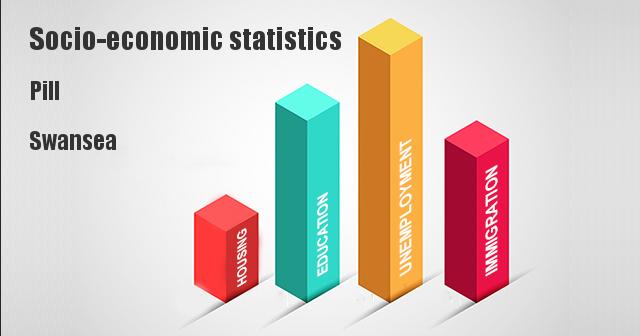Is Pill in Swansea a nice place to live or is it a bit rough? We have collated a series of socio-economic statistics and demographics from UK government sources such as the 2021 Census and the Index of Multiple Deprivation. They should give you a broad snapshot of the area and the surrounding locations. Are the residents of Pill older than the national average or younger? What is the population of Pill and Swansea? What is the claimant count in Pill and how many residents are unemployed? This page should provide you with the answers.Pill Age Distribution Statistics
We have taken the raw data from the 2021 Census and the calculated the proportion of age groups in .| Age Band | Proportion |
|---|
| 4 & under |  |
| 5 - 9 years |  |
| 10 - 15 years |  |
| 16 - 19 years |  |
| 20 - 24 years |  |
| 25 - 34 years |  |
| 35 - 49 years |  |
| 50 - 64 years |  |
| 65 - 74 years |  |
| 75 - 84 years |  |
| 85 years & over |  |
Pill & Immigration Statistics
We have analysed the Census 2021 raw data on country of birth and compiled immigration statistics as percentages of the population. All percentages have been rounded to two decimal places. Below are the figures for Pill in the local area district.
| Area | Born in UK | Born outside UK |
|---|
| 0% | 0% |
|---|
| 0% | 0% |
|---|
| 0% | 0% |
|---|
| 0% | 0% |
|---|
Pill compared to other wards in
| # | Ward | Born in UK | Born outside UK |
|---|
';Pill is ranked out of 0 wards in for the number of residents born outside of the UK.Pill Education Statistics
We have taken the raw data from the 2021 census to found of the level of education Pill residents have in terms of formal qualifications as a percentage. The UK government breaks qualifications down into 7 levels. A detailed explanation of these levels can be found here. However, the Census groups these into just 4 \'levels\'. Here are some examples of the qualifications each census level represents when not stated;
- Level 1 - GCSE grades D, E, F, or G & below
- Level 2 - GCSE A*, A, B, C or O Level grades A, B or C
- Level 3 - A or AS qualification at any grade
- Level 4 - HNC, Bachelors Degree, Masters Degree or Phd
In this first table we have compared Pill to the national average for .
| Level | | |
|---|
| No Qualifications | 0% | 0% |
| Level 1 | 0% | 0% |
| Level 2 | 0% | 0% |
| Apprenticeship | 0% | 0% |
| Level 3 | 0% | 0% |
| Level 4 | 0% | 0% |
Pill Unemployment Statistics
Since the introduction of Universal Credit, The Department for Work & Pensions have not issued any statistics (in our view) that can be used to ascertain the levels of unemployment or under employment in the UK, just meaningless geographic counts. However, the Office of National Statistics does publish claimant counts of people receiving out of work benefits, be that legacy Jobseeker’s Allowance or Universal Credit as a proportion of people over 16. These figures are usually updated once a month and are for Local Authority Districts and Unitary Authority Districts. So below are the figures of .| Area | Unemployed | Yearly Change |
|---|
| % | % |
| % | % |
| % | % |
| UK | 3.7% | -0.3% |
| Economic Status | Proportion |
|---|
| In Employment | 0% |
| In Part-Time Work | 0% |
| Unemployed | 0% |
How many residents own or rent their home in Pill and
We have taken the raw data from the 2021 census and calculated what proportion of people in Pill either own or rent their home. All percentages have been rounded to two decimal places. 0 of residents own their home either outright or mortgaged. 0 of Pill residents rent their home either privately or through a social landlord. | Area | Owned | Rented |
|---|
| 0% | 0% |
| 0% | 0% |
| 0% | 0% |
| 0% | 0% |
Pill has a higher level of home ownership than than the national average.
Pill compared to other wards in
Pill is ranked out of 0 wards in for the percentage of home owners.What are the occupations of the residents of Pill?
The largest employment sector in Pill is Managers, Directors & Senior Officials. The smallest employment sector is Elementary Occupations.| Sector | Proportion |
|---|
| Managers, Directors & Senior Officials | % |
| Professional Occupations | % |
| Associate Professional & Technical | % |
| Administrative & Secretarial | % |
| Skilled Trades | % |
| Caring, leisure & Other Services | % |
| Process Plant & Machine Operatives | % |
| Elementary Occupations | % |
Pill Health Statistics
| Area | VG | G | F | B | VB |
|---|
| 0% | 0% | 0% | 0% | 0% |
| 0% | 0% | 0% | 0% | 0% |
| 0% | 0% | 0% | 0% | 0% |
| 0% | 0% | 0% | 0% | 0% |
VG = Very Good, G = Good, F = Fair, B = Bad & VB = Very Bad
What is the population of Pill and Swansea?
The table below contains the populations figures for each ward in Swansea including Pill. These population ONS figures are estimated are dated Mid 2020.
| Ward | Population |
|---|
| Bishopston | 3138 |
| Bonymaen | 7523 |
| Castle | 17595 |
| Clydach | 7638 |
| Cockett | 14465 |
| Cwmbwrla | 7862 |
| Dunvant | 4256 |
| Fairwood | 2824 |
| Gorseinon | 4698 |
| Gower | 3573 |
| Gowerton | 5092 |
| Killay North | 2754 |
| Killay South | 2205 |
| Kingsbridge | 4317 |
| Landore | 7143 |
| Llangyfelach | 5077 |
| Llansamlet | 15139 |
| Lower Loughor | 2393 |
| Mawr | 1857 |
| Mayals | 2636 |
| Morriston | 16563 |
| Mynyddbach | 9018 |
| Newton | 3395 |
| Oystermouth | 4013 |
| Penclawdd | 3569 |
| Penderry | 12444 |
| Penllergaer | 3372 |
| Pennard | 2777 |
| Penyrheol | 5911 |
| Pontardulais | 6691 |
| Sketty | 14492 |
| St. Thomas | 8272 |
| Townhill | 9166 |
| Uplands | 15397 |
| Upper Loughor | 2897 |
| West Cross | 6401 |
| Swansea Total | 246563 |
Last updated: 20/02/2024, Additional Sources: Office for National Statistics & Department for Work & Pensions.














